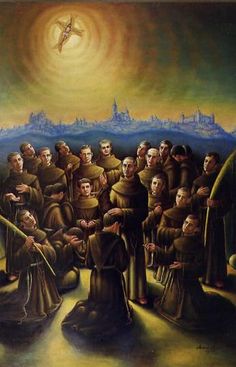Servant of God Saturninus Ibarguren, SJ
Born: February 11, 1856
Died: February 9, 1927
 Fr Saturninus Ibarguren, a Basque, was born at Villareal de Urretxu, in the province of Guipuzcoa, Spain. After he had completed his studies in his hometown at the age of eighteen, he was enlisted into the army and was involved in the Carlist war with Spain.
Fr Saturninus Ibarguren, a Basque, was born at Villareal de Urretxu, in the province of Guipuzcoa, Spain. After he had completed his studies in his hometown at the age of eighteen, he was enlisted into the army and was involved in the Carlist war with Spain.
It was during his 2-year stint in the army that Saturninus’ vocation matured and this led him to enter the Jesuit novitiate in Poyanne, France, on March 31, 1876 when his army duty ended. From the start of his religious vocation, he was known for his faithful observance of the rules and for his practice of mortification. The penances he set for himself and his love for prayer remained with him for the rest of his life.
After he pronounced his three simple vows in 1876, Saturninus began his Humanities in Poyanne for 2 years before returning to Spain for his Philosophy at Carrion de los Condes for one year and two at Ona.
From 1883 to 1887 he taught for a year at Carrionde los Condes and three at La Guardia before returning to Ona for Theology. He was ordained to the priesthood on July 27, 1890.
In 1891 Fr Ibarguren was assigned to Loyola as assistant to the novice master, but two years later, when his province had established a Jesuit house at Xavier castle in Navarre, he was chosen as its first superior. During his eleven years term in Navarre, Fr Ibarguren established the Jesuit residence and also supervised the construction of the basilica dedicated to St Francis Xavier and founded an apostolic school for young boys. This was all in addition to his normal priestly duties of preaching, giving retreats and missions locally as well as in the surrounding towns and villages.
When a wealthy Cuban lady residing in San Sebastian, Spain, desired to establish a Jesuit college and mission centre at Sagua la Grande, in northern Cuba, and asked him to be the founder, Fr Ibarguren, obedient to his superior’s wishes, embarked for Cuba in 1906 and saw to the college opening at the end of 1908 and to the opening of the Jesuit church for worship at the beginning of 1909.
Apart from visiting several of Cuba’s dioceses to preach missions and retreats, Fr Ibarguren also gave retreats to priests and religious communities in Puerto Rico. His zeal for souls and his success in the pulpit made Fr Ibarguren well known and in May 1909, he was assigned to the diocese of Pinar del Rio at the request of its bishop. For the next ten years, he travelled that diocese as an itinerant preacher, catechizing children and adults, baptizing converts and regularizing marriages and it was his powerful sermons that brought the faith back to countless Cubans.
In July 1919, Fr Ibarguren was sent to Cartagena, Colombia. He was sixty three years of age. He set about imitating the example of St Peter Claver, his predecessor, who went to work among the blacks, comforting them in their sorrows while teaching them the basics of the Catholic faith. He regularly visited the city’s hospitals as well as the nearby leprosarium.
By the end of 1925 Fr Ibarguren began to suffer from a prostate disorder, but refused to see a physician until he was unable to endure the pain. He was hospitalized in March 1926. He recovered after several weeks of suffering and returned home in August but was hospitalized again two months later and remained there until January 1927. He was operated on February 8 and became extremely weak. He passed away peacefully on February 9, 1927. He was buried in the crypt of the College of St Joseph in Barranquilla, but later his remains were transferred to the crypt of the Sanctuary of St Peter Claver in Cartagena.
Fr Ibarguren exercised his apostolic ministry in Spain, Cuba and Colombia during his lifetime and was known as a man of prayer, who lived a holy and virtuous life close to God. In view of his virtuous life, the process leading to beatification has been initiated and is in process.
